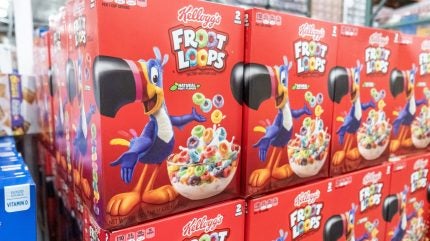
Texas Attorney General Ken Paxton has launched an investigation into WK Kellogg’s marketing claims that portray its cereals as “healthy”.
WK Kellogg, which was spun off from Kellogg Company in 2023, produces a range of cereals including Froot Loops, Rice Krispies and Frosted Flakes.

Discover B2B Marketing That Performs
Combine business intelligence and editorial excellence to reach engaged professionals across 36 leading media platforms.
In a statement, Paxton’s office said WK Kellogg’s has advertised its products as “healthy” in its marketing.
According to the Attorney General’s office, several WK Kellogg cereals “are filled with petroleum-based artificial food colourings” that have been linked to health issues such as hyperactivity, obesity, autoimmune disorders, hormonal imbalances, and cancer.
Paxton added: “A critical part of fighting for our children’s future is putting an end to companies’ deceptive practices that are aimed at misleading parents and families about the health of food products.”
The office further claimed WK Kellogg’s products “specifically contain” artificial food dyes in shades of blue, red, yellow, green and orange.

US Tariffs are shifting - will you react or anticipate?
Don’t let policy changes catch you off guard. Stay proactive with real-time data and expert analysis.
By GlobalDataAlthough the company has previously announced plans to eliminate artificial dyes and the preservative BHT from its cereals, these changes have not yet been implemented in the US, the statement from Paxton’s office read. They have, however, been made in Canada and Europe, it added.
Just Food has approached WK Kellogg for comment.
Paxton said: “Artificial food colourings have been shown to have disastrous impacts on health, and in no world should foods that include these dyes be advertised as ‘healthy.’
“There will be accountability for any company, including Kellogg’s, that unlawfully makes misrepresentations about its food and contributes to a broken health system that has made Americans less healthy.”
The investigation follows a meeting between US Health Secretary Robert F. Kennedy Jr. and major food manufacturers last month in which he urged companies to phase out artificial dyes from their products.
According to Bloomberg, Kennedy’s discussions included companies such as PepsiCo and Kraft Heinz.
Reviewing an email from the Consumer Brands Association (CBA), Reuters reported that Kennedy aims to eliminate artificial dyes from the food supply by 2028.
Before the meeting, Kennedy also directed the FDA to revise safety rules to help eliminate a provision that allows companies to self-affirm that food ingredients are safe.
He asked the FDA to take steps to explore potential rulemaking to revise its Substances Generally Recognized as Safe (GRAS) rule and related guidance to eliminate the self-affirmed GRAS precedent.
“For far too long, ingredient manufacturers and sponsors have exploited a loophole that has allowed new ingredients and chemicals, often with unknown safety data, to be introduced into the US food supply without notification to the FDA or the public,” Kennedy said at the time.
In January, the FDA announced plans to ban Red 3 food colouring in food, supplements, and ingestible drugs.
Known as erythrosine or FD&C Red No. 3, the dye provides a cherry-red hue and is used in confectionery, cookies, frozen desserts and medications.





